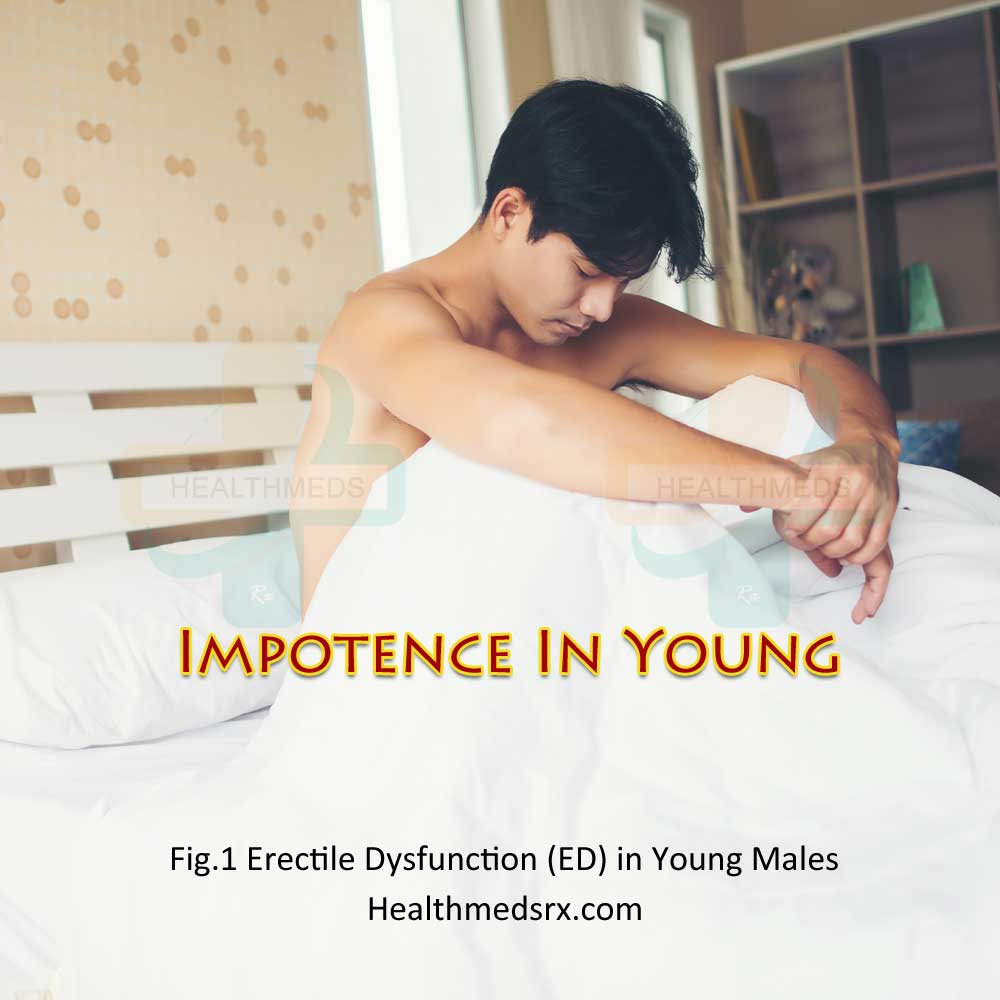Erectile Dysfunction in Young Males is not uncommon. Erectile Dysfunction or impotence is not only an issue in older men but is also increasing among young men. We are here to discuss information about the Causes, treatments, and prevention of erectile dysfunction in Young men.
Causes of Erectile Dysfunction in Young Males:
1. Physical Factors:
- Hormonal disorders: Low testosterone levels are one example of a hormonal issue that might lead to ED. A lack of testosterone can impact desire and the capacity to obtain and sustain an erection. Testosterone is an essential hormone for sexual function.
- Neurological diseases: A number of neurological conditions, such as Parkinson’s disease, multiple sclerosis, or spinal cord injuries, can obstruct the flow of nerve signals from the brain to the penis. This disturbance may result in ED.
- Diabetes: Diabetes can harm the blood vessels and nerves in the body, which affects the penis’s blood flow and nerve sensitivity. Blood sugar levels that are not properly managed can make someone more likely to develop ED.
- Medication side effects that lead to ED include those from antipsychotics, blood pressure medicines, and antidepressants, among others. Substance misuse can also affect sexual function, whether it be from excessive alcohol intake, tobacco usage, or the use of illegal drugs.
- Peyronie’s disease: During an erection, the penis will bend or curve due to the development of fibrous scar tissue inside the penis due to Peyronie’s disease. The curvature may make it difficult or impossible to engage in sexual activity.
- Trauma or surgery to the pelvic region, such as prostate surgery, can harm the nerves, blood vessels, or tissues involved in the erectile process, which can result in ED.
2. Psychological Factors:
- Performance anxiety: Stress and pressure brought on by sexual performance anxiety can make it difficult to get or keep an erection. Performance anxiety exacerbates when one worries about one’s sexual prowess or the fear of disappointing a partner.
- Stress and emotional distress: High levels of stress,, money, relationships, or other life events impact sexual performance. Emotional distress, such as depression, anxiety disorders, or a history of trauma are contributing factors too.
- Relationship concerns: Relationship troubles, a lack of emotional connection, poor communication, or unresolved disagreements within a couple can cause ED. The desire for sexual activity may decline and getting an erection may be challenging in troubled or unhappy relationships.
- Body image problems: Sexual confidence can be impacted and ED can be exacerbated by having a poor body image or being dissatisfied with one’s looks. Men who are self-conscious about their bodies may have trouble getting erections or keeping them up.
- Pornography and excessive masturbation: Constantly watching porn or engaging in excessive masturbation can make people less sensitive to real-world sexual sensations. This may make it harder to get or keep an erection during private or solo masturbation or sexual interactions without the unique stimuli found in pornography.
- Low self-esteem can affect many facets of life, including sexual performance and self-assurance. Low self-esteem in men might cause them to mistrust their sexual prowess, which can cause anxiety and ED.
- Factors of culture and religion: Cultural or religious norms and beliefs around sex might lead to tensions or feelings of guilt regarding sexual behavior. These internal conflicts could make ED worse.
Treatments for Erectile Dysfunction in Young Males:
- Lifestyle changes: Making certain lifestyle modifications can help improve erectile function. This may include regular exercise, maintaining a healthy weight, eating a balanced diet, managing stress, getting enough sleep, and reducing alcohol consumption and tobacco use.
- Psychological counseling: If psychological factors are contributing to ED, counseling or therapy can be beneficial. Cognitive-behavioral therapy (CBT) and other forms of therapy can help address performance anxiety, relationship issues, stress, or emotional distress that may be impacting sexual function.
- Medication: To enhance erectile function, doctors frequently prescribe oral drugs such sildenafil (Cenforce, Kamagra), tadalafil (Tadagra), vardenafil (Levitra), or avanafil (Stendra). These drugs function by improving blood flow to the penis, which makes it easier to get and keep an erection. However, doctor’s approval and following a careful examination is most important.
- Hormone replacement therapy is important where hormonal imbalances, particularly low testosterone levels, are a factor in ED. Testosterone replacement therapy can enhance libido, sexual performance, and general health. Necessary testing and evaluation.
- Vacuum erection devices: Vacuum erection devices (VED) are mechanical devices that create a vacuum around the penis, drawing blood into it and facilitating an erection. A constriction band is placed at the base of the penis to maintain the erection. VEDs can be effective for some individuals and are non-invasive.
- Penile injections or suppositories: Medications such as alprostadil are directed into the base or side of the penis, or inserted as suppositories, improves blood flow and induce an erection. These methods are effective for some individuals and are typically used when oral medications are not effective or suitable.
- Surgery: In rare cases, surgical interventions may be considered for young men with specific anatomical or vascular abnormalities causing ED. Procedures such as penile implants or vascular surgery can help restore erectile function.
Prevention and Maintenance of Erectile Function:
- 1. Open Communication: Maintaining open and honest communication with your partner and healthcare professional can help address concerns and seek appropriate help.
- 2. Avoidance of Substance Abuse: Alcohol, drugs, and tobacco can have detrimental effects on erectile function. Limiting or avoiding these substances promotes sexual health.
- 3. Regular Health Check-ups: Regular health check-ups are vital for monitoring overall health. Addressing any potential underlying conditions early can help prevent erectile dysfunction.


